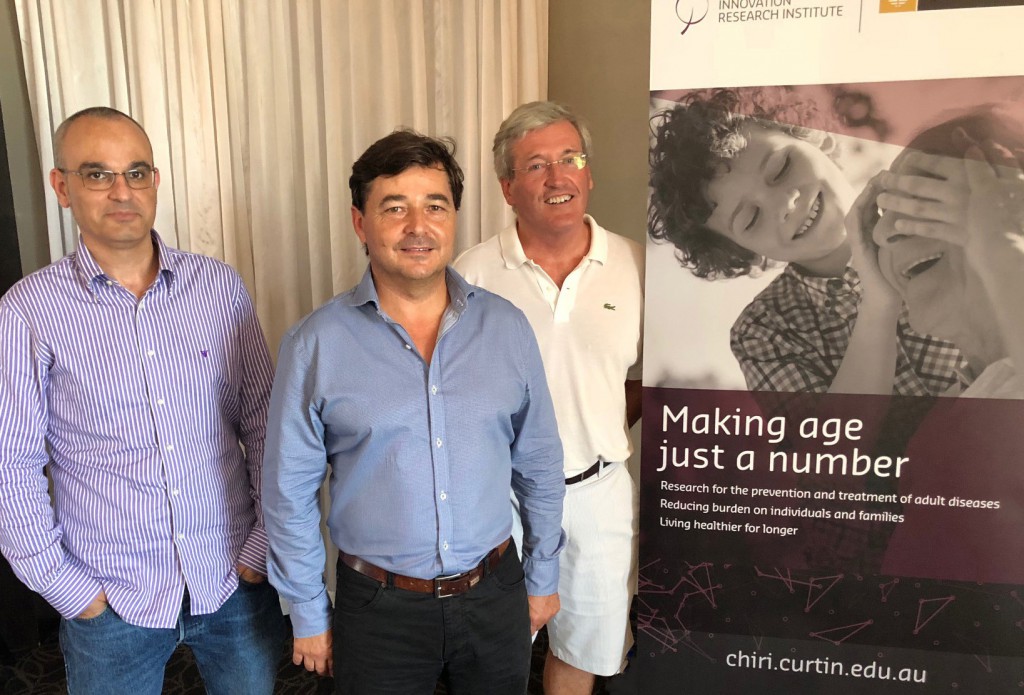A collaborative team led by Curtin Health Innovation Research Institute (CHIRI) researchers is hopeful of inspiring new and innovative prevention strategies to control the burden of metabolic-related conditions after securing funding through a competitive national grants scheme.
Funded by the Endeavour College of Natural Health in late 2018, the grant is aimed at mechanistically characterising how nutraceutical compounds (a group of chemical compounds of plant origin, which are claimed to provide health benefits) modulate the gut-liver axis to prevent the development of metabolic disorders.
The research team includes CHIRI researchers Professor Fergal O’Gara, Dr Jose Caparros-Martin and Dr Ricky Lareu from Curtin’s School of Pharmacy and Biomedical Sciences, and Dr Natalie Ward from the School of Public Health, in collaboration with Dr Sangeetha Mathavan (Endeavour College of Natural Health and Curtin University) and Dr Patricia Agudelo-Romero (Telethon Kids Institute and The University of Western Australia).
The team will use the grant to carry out different ‘omics’ analyses to progress its research program on the molecular pathways involved in host-gut microbiota interaction.
“Metabolic-related disorders such as cardiovascular disease are often associated with middle-aged and elderly and equally affect developing and mid-to-high-income countries,” Dr Ward said.
“Although the lifestyle-related causes have been well delineated, during recent years the spotlight has turned to a number of previously ignored factors such as the gut microbiota.”
“There is now an urgent need to understand the molecular mechanisms through which these new players participate in the aetiology of metabolic-related conditions,” Dr Caparros-Martin said
By integrating physiological data, transcriptional and gut microbial profiles after dietary interventions, the researchers will identify pathways modulated by nutraceuticals and involved in the development of metabolic alterations.
The data obtained through the study will provide novel and significant insight on the host-gut microbiota interaction in the development of obesity and hyperglycaemia and hopefully inspire innovative prevention strategies to control the burden of metabolic-related conditions.
“While the health benefits of nutraceutical compounds are known, specific mechanisms behind their beneficial effects remain to be decoded,” Dr Lareu said.
Professor Fergal O’Gara said, “By characterising the effect of nutraceutical compounds on the composition of gut microbiota and the potential effect on preventing the development of risk factors associated with metabolic syndrome, we will enhance our current knowledge about how these compounds improve human health, as well as offer new therapeutic options in the treatment and prevention of these disorders.”
About CHIRI’s researchers
Professor Fergal O’Gara, who is Director of the Human Microbiome Programme at Curtin University and whose research focus with CHIRI is on host-microbiota interaction, is providing microbiology inputs and analytical expertise to the study.
Dr Jose Caparros-Martin’s research at CHIRI is focused on host-microbiota interaction in health and disease. He is coordinating the research project and contributing his microbiome analysis expertise.
Dr Natalie Ward’s research focuses on dietary interventions to prevent the development of cardiovascular disease. She is providing nutrition and physiology-related input into the study.
Dr Ricky Lareu, whose research is focused on liver physiology, is contributing his expertise on liver biology.
